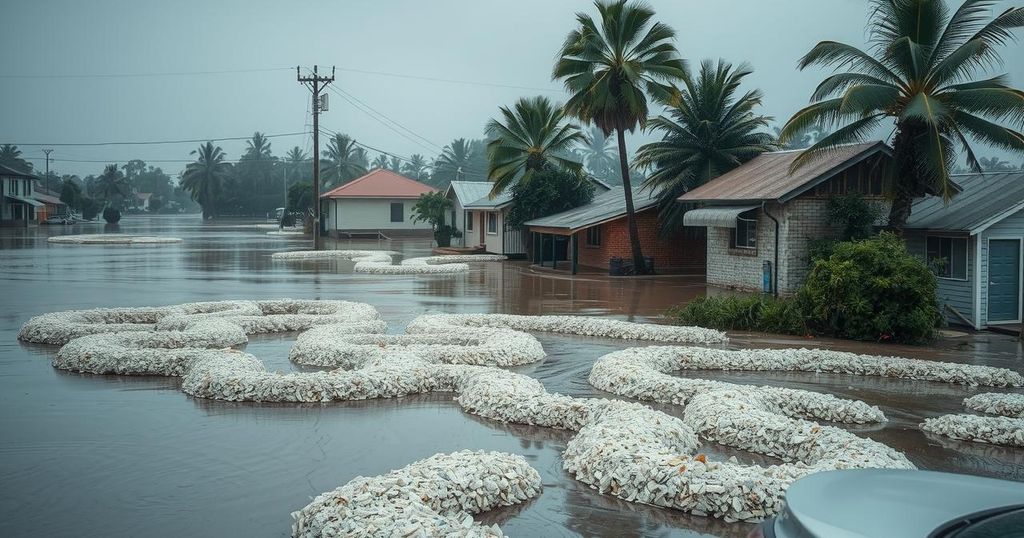Global news
AFRICA, ATLANTIC OCEAN, CABO DELGADO, CHI, CHIURE, EMERGENCY RELIEF, EMERGENCY RESPONSE, INDIAN OCEAN, ISA, ISADORA ZONI, ISLAMIC STATE, MECUFI, MOZAMBIQUE, NATIONAL INSTITUTE FOR NATURAL DISASTERS, NATURAL DISASTER, NATURAL DISASTERS, UNITED NATIONS, UNITED NATIONS ’ REFUGEE AGENCY, UNITED NATIONS OFFICE FOR THE COORDINATION OF HUMANITARIAN AFFAIRS, ZONI
Isaac Bennett
0 Comments
Cyclone Chido’s Impact in Mozambique: Death Toll Rises to 75 Amid Destruction
Cyclone Chido has caused extensive destruction in Cabo Delgado, Mozambique, resulting in a death toll now at 75, nearly double previous estimates. The cyclone has compounded existing humanitarian crises in a region already struggling with conflict. The destruction includes obliterated homes and health facilities, impacting thousands already displaced by violence. The storm is part of a broader trend of increasing climate-related disasters in Mozambique, necessitating urgent international aid and attention.
Cyclone Chido has wreaked significant devastation in Mozambique, with the death toll soaring to 75, per the latest government statements. This grim surge in numbers follows a dire assessment of damage as rescue workers gain access to previously isolated areas. The cyclone struck Cabo Delgado province, already beleaguered by a lengthy insurgency supported by the Islamic State, further complicating humanitarian efforts. Its winds reached up to 115 miles per hour, reminiscent of a Category 3 hurricane, obliterating structures and displacing thousands. Reports indicate that the cyclone claimed 69 lives in Cabo Delgado alone, while 740 individuals sustained injuries. In Mecufi, a district described as utterly destroyed, blocks of mud homes were washed away, and public health infrastructure suffered irreparable damage, leading to widespread panic in a region already grappling with chaos due to conflict.
The wide-ranging impacts of Cyclone Chido are felt severely across Cabo Delgado, a province that has seen hundreds of thousands displaced due to prior violence. Many who sought refuge in temporary shelters are now left with even less, as the cyclone has worsened their precarious living situations. The aftermath encapsulates the vulnerabilities faced by Mozambique, a nation struggling with poverty and the increasing impacts of climate change. Meanwhile, neighboring regions such as Mayotte, a French archipelago off eastern Africa, also faced the cyclone’s fury, resulting in at least 31 casualties.
Looking ahead, Cyclone Chido may herald a wetter and more destructive rainy season in southern Africa, raising concerns for future humanitarian crises. Past cyclones, such as Tropical Cyclone Freddy and Gombe, illustrate the ongoing threat of extreme weather events in Mozambique, where nearly 140,000 individuals have already been displaced in recent years due to climate-related disasters. The international community must take swift action to provide the necessary relief and support to mitigate the compounded crises facing this vulnerable nation.
Cyclone Chido represents one of the latest natural disasters to impact Mozambique, a country that frequently experiences intense storms due to its geographical position along the southern Indian Ocean. The nation is particularly susceptible to extreme weather conditions exacerbated by climate change. The province of Cabo Delgado has faced additional challenges due to an ongoing insurgent conflict, leading to the displacement of numerous communities and heightened humanitarian needs. The history of cyclones in the region, such as Tropical Cyclone Freddy and Gombe, has already established a pattern of destruction, loss of life, and forced migration, necessitating comprehensive disaster preparedness and response strategies.
In conclusion, Cyclone Chido’s devastation highlights the urgent need for humanitarian assistance in Mozambique. With a considerable rise in the death toll and extensive damage to infrastructure, particularly in Cabo Delgado province, local communities are enduring compound crises due to climate change and ongoing violence. International support is critical to address the immediate and long-term effects of such catastrophic events, especially as the region braces for increasingly severe weather patterns.
Original Source: www.nytimes.com




Post Comment